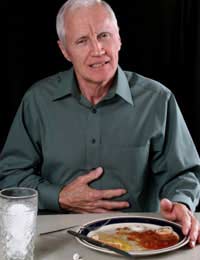Which Drugs or Food Interact With Antacids?

Antacid drugs neutralise the stomach’s natural acids. Antacids are used to treat nausea; acid indigestion, caused by excess stomach acid; heartburn (acid reflux), caused by stomach acid leaking back from the stomach into the oesophagus (gastroesophageal reflex disease or GERD); inflammation of the oesophagus (oesophagitis), stomach (gastritis) and duodenum (duodenitis); and ulcers, where stomach acid damages the walls of the oesophagus, stomach (peptic ulcers) or duodenum (duodenal ulcers).
Talk to a pharmacist or doctor if you have any concerns over food or drug interactions, or if you are taking a new drug or food supplement, even if it is a common, over-the-counter one. Carefully read any instructions with the medicine.
What’s In An Antacid?
The active ingredients in antacids can include:- aluminium carbonate
- aluminium hydroxide
- bismuth subsalicylate
- calcium acetate
- calcium carbonate
- hydrotalcite
- magaldrate (aluminium-magnesium hydroxide sulphate)
- magnesium hydroxide
- magnesium oxide
- magnesium trisilicate
- sodium bicarbonate.
What Drugs Interact With Antacids?
Antacids can make people absorb drugs more slowly – this can make drugs less effective, so it is best to leave an hour or two between taking an antacid and taking other drugs.Because antacids reduce the acidity in the stomach and other parts of the gut, this might reduce the absorption of nutrients, including zinc and folic acid. This can also affect absorption of acidic drugs, including digoxin (heart conditions), phenytoin (epilepsy), chlorpromazine (schizophrenia) and isoniazid (tuberculosis). Other drugs where antacids can reduce the absorption include delavirdine, amprenavir and atazanavir (HIV), dasatinib (cancer), some antifungal medicines and some anticoagulants (blood thinning medications)
Antacids can also make some drugs be absorbed more quickly, which might make the drugs too effective, or the side effects worse. These include pseudoephedrine (blocked nose and sinusitis) and levodopa (Parkinson’s disease).
Magnesium trisilicate and magnesium hydroxide can bind to some drugs, which will make them less effective. Examples of this are the tetracycline antibiotics, including tetracycline, demeclocycline, doxycycline, minocycline and oxytetracycline, and iron and phosphate supplements.
Sodium bicarbonate makes the urine alkaline, which can change the speed at which the body gets rid of some drugs. This means that alkaline drugs, such as quinidine (corrects heart rhythm) and amphetamines (ADHD and narcolepsy) leave the body more slowly, and so might be too effective, or have more side effects; and acidic drugs, such as aspirin (pain, fever) leave the body more quickly, and so may be less effective.
What Foods Interact With Antacids?
Take antacids with food, as this can make their effect last longer. Caffeine and alcohol can trigger the production of more stomach acid, making heartburn worse.Too much milk and dairy produce with antacids can lead to ‘milk-alkali syndrome’ or hypercalcaemia (high levels of calcium in the blood). Symptoms are an increased risk of bone fractures and kidney stones, weight loss, vomiting, constipation, weakness, tiredness and changes in mental status.
Drinking orange juice with antacids containing aluminium can increase the absorption of the aluminium.

Re: Which Drugs or Foods React With Enoxaparin?
I am presently treating a DVT with clexane. I have also read so many articles which state that ginger has blood…
Re: Which Drugs or Foods React With Aspirin?
I had breast cancer 18 months ago. I had a mastectomy and have had chemo and radiotherapy Medication I am…
Re: Which Drugs or Foods React With Agrylin?
I am considering Agrylin because I have been onHydroxyurea for 8 Years. I have had 26 surgeries for skin cancer…
Re: Fatty Food and Drugs
Advocate for fatty meal intake prior to administration of lipophobic drugs when a delayed onset of action of drug is desired
Re: Fatty Food and Drugs
Advocate for fatty meal intake prior to administration of lipophilic drugs when a delayed onset of drug action is desired. I humbly need help
Re: Which Drugs or Food Interact With HRT?
I’m currently on Prempro and it seems to have started to not work as greatly as it had. Rather than up my dosage…
Re: Which Drugs or Foods React With Inhibitors?
@Jojo - it sounds like a case of keeping to what has been tried and tested! Hope you're now back to normal.
Re: Which Drugs or Foods React With Inhibitors?
I have been on Nardil for many years, and have had one or two incidents in the past, headaches…
Re: Which Drugs or Food Interact With HRT?
I am on hrt patches can I take fo ti which is a Chinese supplement along with them
Re: Which Drugs or Foods React With Warfarin?
Papa - Your Question:I take 6mg warfrain daily after having pulmonary embolism covering both lungs.Can I take an…